Interventions with family caregivers of cancer patients: meta-analysis of randomized trials
- PMID: 20709946
- PMCID: PMC2946584
- DOI: 10.3322/caac.20081
Interventions with family caregivers of cancer patients: meta-analysis of randomized trials
Abstract
Family caregivers of cancer patients receive little preparation, information, or support to perform their caregiving role. However, their psychosocial needs must be addressed so they can maintain their own health and provide the best possible care to the patient. The purpose of this article is to analyze the types of interventions offered to family caregivers of cancer patients, and to determine the effect of these interventions on various caregiver outcomes. Meta-analysis was used to analyze data obtained from 29 randomized clinical trials published from 1983 through March 2009. Three types of interventions were offered to caregivers: psychoeducational, skills training, and therapeutic counseling. Most interventions were delivered jointly to patients and caregivers, but they varied considerably with regard to dose and duration. The majority of caregivers were female (64%) and Caucasian (84%), and ranged in age from 18 to 92 years (mean age, 55 years). Meta-analysis indicated that although these interventions had small to medium effects, they significantly reduced caregiver burden, improved caregivers' ability to cope, increased their self-efficacy, and improved aspects of their quality of life. Various intervention characteristics were also examined as potential moderators. Clinicians need to deliver research-tested interventions to help caregivers and patients cope effectively and maintain their quality of life.
Copyright 2010 American Cancer Society, Inc.
Figures




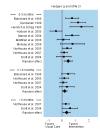
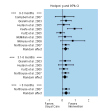

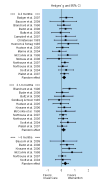

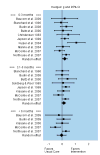
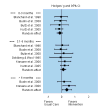
References
-
- Bishop MM, Beaumont JL, Hahn EA, et al. Late effects of cancer and hematopoietic stem-cell transplantation on spouses or partners compared with survivors and survivor-matched controls. J Clin Oncol. 2007;25:1403–1411. - PubMed
-
- Given BA, Given CW, Kozachik S. Family support in advanced cancer. CA Cancer J Clin. 2001;51:213–231. - PubMed
-
- Arno PS, Levine C, Memmott MM. The economic value of informal caregiving. Health Affairs. 1999;18(2):182–188. - PubMed
-
- Cochrane B, Lewis FM. The partner’s adjustment to breast cancer: A critical analysis of intervention studies. Health Psychol. 2005;24:327–332. - PubMed

